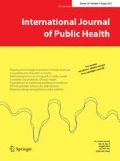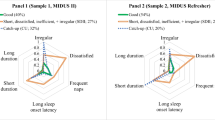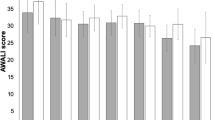Abstract
Objectives
The extent to which work hours and sleep are associated with self-rated health (SRH) was investigated in full-time employees of small- and medium-scale businesses (SMBs) in a suburb of Tokyo.
Methods
A total of 2,579 employees (1,887 men and 692 women), aged 18–79 (mean 45) years, in 296 SMBs were surveyed using a self-administered questionnaire from August to December 2002. Work hours, sleep, and SRH were evaluated.
Results
Compared with those working 6–8 h/day, participants working >8 to 10 h/day and >10 h/day had significantly higher odds of suboptimal SRH [adjusted odds ratio (aOR) 1.36 and 1.87, respectively]. Similarly, compared with those sleeping 6+ h/day and sufficient sleep, participants with short sleep (<6 h/day) and insufficient sleep had increased odds of suboptimal SRH (aOR 1.65 and aOR 2.03, respectively). Combinations of the longest work hours with short sleep (aOR 3.30) or insufficient sleep (aOR 3.40) exerted synergistic negative associations on SRH.
Conclusions
This study suggests that long work hours and poor sleep and its combination are associated with suboptimal SRH.
Similar content being viewed by others
References
Baldwin PJ, Dodd M, Wrate RW (1997) Young doctors’ health—I. How do working conditions affect attitudes, health and performance? Soc Sci Med 45(1):35–40
Basner M, Fomberstein KM, Razavi FM, Banks S, William JH, Rosa RR, Dinges DF (2007) American time use survey: sleep time and its relationship to waking activities. Sleep 30(9):1085–1095
Borg V, Kristensen TS (1999) Psychosocial work environment and mental health among travelling salespeople. Work Stress 13(2):132–143
Caruso CC (2006) Possible broad impacts of long work hours. Ind Health 44(4):531–536
Ettner SL, Grzywacz JG (2001) Workers’ perceptions of how jobs affect health: a social ecological perspective. J Occup Health Psychol 6(2):101–113
Fujishiro K, Xu J, Gong F (2010) What does “occupation” represent as an indicator of socioeconomic status? Exploring occupational prestige and health. Soc Sci Med 71(12):2100–2107
Grosch JW, Caruso CC, Rosa RR, Sauter SL (2006) Long hours of work in the US: associations with demographic and organizational characteristics, psychosocial working conditions, and health. Am J Ind Med 49(11):943–952
Hasson D, Arnetz BB, Theorell T, Anderberg UM (2006) Predictors of self-rated health: a 12-month prospective study of IT and media workers. Popul Health Metr 4:8
Hurrell JJ, Jr, McLaney MA (1988) Exposure to job stress—a new psychometric instrument. Scand J Work Environ Health 14(Suppl 1):27–28
Idler EL, Russell LB, Davis D (2000) Survival, functional limitations, and self-rated health in the NHANES I Epidemiologic Follow-up Study, 1992. First National Health and Nutrition Examination Survey. Am J Epidemiol 152(9):874–883
Jex SM, Bliese PD (1999) Efficacy beliefs as a moderator of the impact of work-related stressors: a multilevel study. J Appl Psychol 84(3):349–361
Jylha M (2009) What is self-rated health and why does it predict mortality? Towards a unified conceptual model. Soc Sci Med 69(3):307–316
Jylha M, Volpato S, Guralnik JM (2006) Self-rated health showed a graded association with frequently used biomarkers in a large population sample. J Clin Epidemiol 59(5):465–471
Kaleta D, Makowiec-Dabrowska T, Dziankowska-Zaborszczyk E, Jegier A (2006) Physical activity and self-perceived health status. Int J Occup Med Environ Health 19(1):61–69
Kawada T (2003) Self-rated health and life prognosis. Arch Med Res 34(4):343–347
Kawakami N, Araki S, Takatsuka N, Shimizu H, Ishibashi H (1999) Overtime, psychosocial working conditions, and occurrence of non-insulin dependent diabetes mellitus in Japanese men. J Epidemiol Community Health 53(6):359–363
Khang YH, Kim HR (2010) Self-rated health and mortality: gender- and age-specific contributions of explanatory factors in South Korea. Int J Public Health 55(4):279–289
Kleppa E, Sanne B, Tell GS (2008) Working overtime is associated with anxiety and depression: the Hordaland Health Study. J Occup Environ Med 50(6):658–666
Liu Y, Tanaka H (2002) Overtime work, insufficient sleep, and risk of non-fatal acute myocardial infarction in Japanese men. Occup Environ Med 59(7):447–451
Nakanishi N, Yoshida H, Nagano K, Kawashimo H, Nakamura K, Tatara K (2001) Long working hours and risk for hypertension in Japanese male white collar workers. J Epidemiol Community Health 55(5):316–322
Nakata A, Takahashi M, Ikeda T, Haratani T, Hojou M, Araki S (2007) Perceived job stress and sleep-related breathing disturbance in Japanese male workers. Soc Sci Med 64(12):2520–2532
Nakata A, Takahashi M, Haratani T, Ikeda T, Hojou M, Fujioka Y, Araki S (2008) Association of active and passive smoking with sleep disturbances and short sleep duration among Japanese working population. Int J Behav Med 15(2):81–91
Nakata A, Takahashi M, Swanson NG, Ikeda T, Hojou M (2009) Active cigarette smoking, secondhand smoke exposure at work and home, and self-rated health. Public Health 123(10):650–656
Nakata A, Takahashi M, Otsuka Y, Swanson NG (2010) Is self-rated health associated with blood immune markers in healthy individuals? Int J Behav Med 17(3):234–242
Niedhammer I, Tek ML, Starke D, Siegrist J (2004) Effort–reward imbalance model and self-reported health: cross-sectional and prospective findings from the GAZEL cohort. Soc Sci Med 58(8):1531–1541
Rugulies R, Aust B, Burr H, Bultmann U (2008) Job insecurity, chances on the labour market and decline in self-rated health in a representative sample of the Danish workforce. J Epidemiol Community Health 62(3):245–250
Segovia J, Bartlett RF, Edwards AC (1989) The association between self-assessed health status and individual health practices. Can J Public Health 80(1):32–37
Sekine M, Chandola T, Martikainen P, Marmot M, Kagamimori S (2009) Socioeconomic inequalities in physical and mental functioning of British, Finnish, and Japanese civil servants: role of job demand, control, and work hours. Soc Sci Med 69(10):1417–1425
Steptoe A, Wardle J, Lipsey Z, Mills R, Oliver G, Jarvis M, Kirschbaum C (1998) A longitudinal study of work load and variations in psychological well-being, cortisol, smoking, and alcohol consumption. Ann Behav Med 20(2):84–91
Steptoe A, Peacey V, Wardle J (2006) Sleep duration and health in young adults. Arch Intern Med 166(16):1689–1692
Svedberg P, Bardage C, Sandin S, Pedersen NL (2006) A prospective study of health, life-style and psychosocial predictors of self-rated health. Eur J Epidemiol 21(10):767–776
Taris TW, Ybema JF, Beckers DG, Verheijden MW, Geurts SA, Kompier MA (2011) Investigating the associations among overtime work, health behaviors, and health: a longitudinal study among full-time employees. Int J Behav Med (in press)
Tyssen R, Vaglum P, Gronvold NT, Ekeberg O (2000) The impact of job stress and working conditions on mental health problems among junior house officers. A nationwide Norwegian prospective cohort study. Med Educ 34(5):374–384
Vahtera J, Westerlund H, Ferrie JE, Head J, Melchior M, Singh-Manoux A, Zins M, Goldberg M, Alexanderson K, Kivimaki M (2010) All-cause and diagnosis-specific sickness absence as a predictor of sustained suboptimal health: a 14-year follow-up in the GAZEL cohort. J Epidemiol Community Health 64(4):311–317
van der Hulst M (2003) Long work hours and health. Scand J Work Environ Health 29(3):171–188
van Ginkel JR, van der Ark LA (2005) SPSS syntax for missing value imputation in test and questionnaire data. Appl Psychol Meas 29(2):152–153
Virtanen M, Ferrie JE, Gimeno D, Vahtera J, Elovainio M, Singh-Manoux A, Marmot MG, Kivimaki M (2009a) Long working hours and sleep disturbances: the Whitehall II prospective cohort study. Sleep 32(6):737–745
Virtanen M, Singh-Manoux A, Ferrie JE, Gimeno D, Marmot MG, Elovainio M, Jokela M, Vahtera J, Kivimaki M (2009b) Long working hours and cognitive function: the Whitehall II Study. Am J Epidemiol 169(5):596–605
Wada K, Katoh N, Aratake Y, Furukawa Y, Hayashi T, Satoh E, Tanaka K, Satoh T, Aizawa Y (2006) Effects of overtime work on blood pressure and body mass index in Japanese male workers. Occup Med (Lond) 56(8):578–580
Yang H, Schnall PL, Jauregui M, Su TC, Baker D (2006) Work hours and self-reported hypertension among working people in California. Hypertension 48(4):744–750
Acknowledgments
The author is grateful to all the volunteers who participated in this study. The author also would like to express deepest appreciation to Dr. Masaya Takahashi, PhD, at the Japan National Institute of Occupational Safety and Health for his study design consulting; Dr. Tomoko Ikeda, PhD, at the University of Occupational and Environmental Health, Japan; and Dr. Minoru Hojou, MD, at the Ohta Regional Occupational Health Center for their help in data collection. I also would like to thank Ms. Robin Dunkin for her statistical consulting. These individuals report no conflicts of interest. The findings and conclusions in this report are those of the author and do not necessarily represent the views of the US National Institute for Occupational Safety and Health.
Conflict of interest
The author declares that he has no competing interests.
Author information
Authors and Affiliations
Corresponding author
Rights and permissions
About this article
Cite this article
Nakata, A. Investigating the associations between work hours, sleep status, and self-reported health among full-time employees. Int J Public Health 57, 403–411 (2012). https://doi.org/10.1007/s00038-011-0242-z
Received:
Revised:
Accepted:
Published:
Issue Date:
DOI: https://doi.org/10.1007/s00038-011-0242-z




